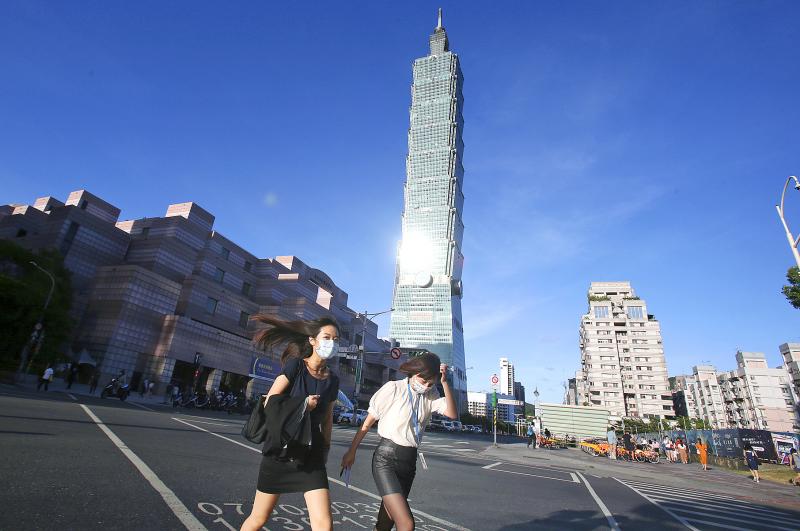Taiwan’s investment ranking rose one position to No. 3, with major risk factors improving compared with the previous assessment in December last year, a report by US-based Business Environment Risk Intelligence SA (BERI) said.
Taiwan scored a higher profit opportunity recommendation of 62, up from 60 in December, tracking behind Norway and Switzerland among the 50 countries assessed by BERI. South Korea was also 62, matching Taiwan’s investment ranking and grade of 1C.
Taiwan is expected to retain the No. 3 position next year, with the score rising slightly to 63, it said.

Photo: AP
BERI issues three investment assessment reports every April, August and December. Three key indicators are used to gauge a country’s investment risk: operations risk, political risk, and a remittance and repatriation factor, or foreign exchange risk.
Taiwan advanced one position in its operations risk ranking to No. 2, next only to the US and better than all its Asian trade competitors, including South Korea at No. 5, China at No. 15 and Singapore at No. 18, the report showed.
Taiwan scored 65 in this category, up from 63 in December.
In operations risk, Taiwan improved in 11 sub-categories, including economic growth, contract execution, and labor cost and productivity, giving it a top 5 ranking.
Taiwan received an improved score of 42 in political risk, up from 38 in December, placing it at No. 24, the report showed.
Taiwan lagged behind its major Asian competitors in this category. Singapore ranked No. 3, while China and Japan ranked No. 5 and No. 7 respectively.
In foreign exchange risk, Taiwan placed No. 1, holding its score of 80 from December, given its excellent foreign exchange reserves, foreign debt and international reserve. South Korea placed at No. 7, Singapore and Japan tied at No. 8 and China placed at No. 12.

KEEPING UP: The acquisition of a cleanroom in Taiwan would enable Micron to increase production in a market where demand continues to outpace supply, a Micron official said Micron Technology Inc has signed a letter of intent to buy a fabrication site in Taiwan from Powerchip Semiconductor Manufacturing Corp (力積電) for US$1.8 billion to expand its production of memory chips. Micron would take control of the P5 site in Miaoli County’s Tongluo Township (銅鑼) and plans to ramp up DRAM production in phases after the transaction closes in the second quarter, the company said in a statement on Saturday. The acquisition includes an existing 12 inch fab cleanroom of 27,871m2 and would further position Micron to address growing global demand for memory solutions, the company said. Micron expects the transaction to

Vincent Wei led fellow Singaporean farmers around an empty Malaysian plot, laying out plans for a greenhouse and rows of leafy vegetables. What he pitched was not just space for crops, but a lifeline for growers struggling to make ends meet in a city-state with high prices and little vacant land. The future agriculture hub is part of a joint special economic zone launched last year by the two neighbors, expected to cost US$123 million and produce 10,000 tonnes of fresh produce annually. It is attracting Singaporean farmers with promises of cheaper land, labor and energy just over the border.

US actor Matthew McConaughey has filed recordings of his image and voice with US patent authorities to protect them from unauthorized usage by artificial intelligence (AI) platforms, a representative said earlier this week. Several video clips and audio recordings were registered by the commercial arm of the Just Keep Livin’ Foundation, a non-profit created by the Oscar-winning actor and his wife, Camila, according to the US Patent and Trademark Office database. Many artists are increasingly concerned about the uncontrolled use of their image via generative AI since the rollout of ChatGPT and other AI-powered tools. Several US states have adopted

A proposed billionaires’ tax in California has ignited a political uproar in Silicon Valley, with tech titans threatening to leave the state while California Governor Gavin Newsom of the Democratic Party maneuvers to defeat a levy that he fears would lead to an exodus of wealth. A technology mecca, California has more billionaires than any other US state — a few hundred, by some estimates. About half its personal income tax revenue, a financial backbone in the nearly US$350 billion budget, comes from the top 1 percent of earners. A large healthcare union is attempting to place a proposal before